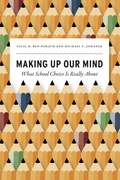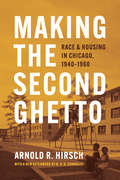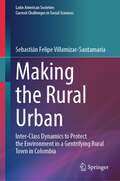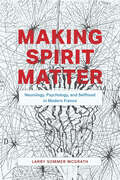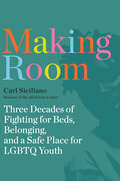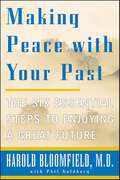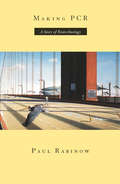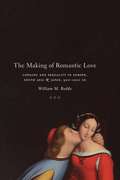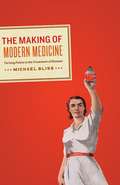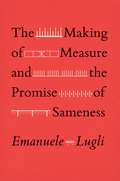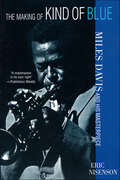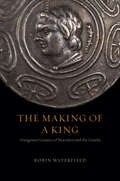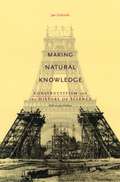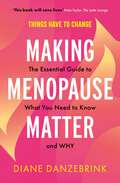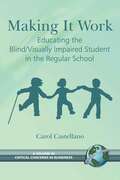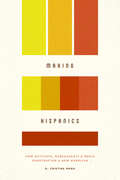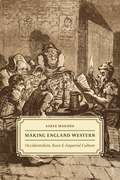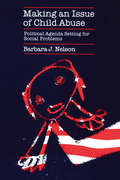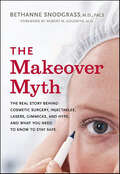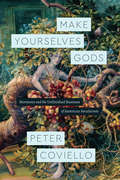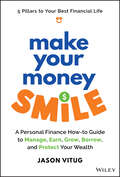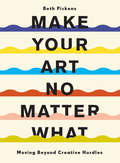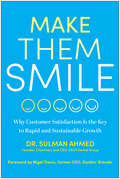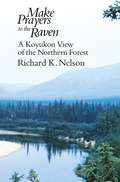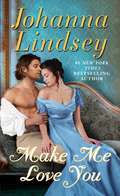- Table View
- List View
Making Up Our Mind: What School Choice Is Really About (History and Philosophy of Education Series)
by Sigal R. Ben-Porath Michael C. JohanekIf free market advocates had total control over education policy, would the shared public system of education collapse? Would school choice revitalize schooling with its innovative force? With proliferating charters and voucher schemes, would the United States finally make a dramatic break with its past and expand parental choice? Those are not only the wrong questions—they’re the wrong premises, argue philosopher Sigal R. Ben-Porath and historian Michael C. Johanek in Making Up Our Mind. Market-driven school choices aren’t new. They predate the republic, and for generations parents have chosen to educate their children through an evolving mix of publicly supported, private, charitable, and entrepreneurial enterprises. The question is not whether to have school choice. It is how we will regulate who has which choices in our mixed market for schooling—and what we, as a nation, hope to accomplish with that mix of choices. Looking beyond the simplistic divide between those who oppose government intervention and those who support public education, the authors make the case for a structured landscape of choice in schooling, one that protects the interests of children and of society, while also identifying key shared values on which a broadly acceptable policy could rest.
Making the Second Ghetto: Race & Housing in Chicago, 1940–1960 (Historical Studies of Urban America)
by Arnold R. HirschFirst published in 1983 and praised by the likes of Ta-Nehisi Coates and Thomas Sugrue, Arnold R. Hirsch’s Making the Second Ghetto is the rare book that has only become more piercingly prescient over the years. Hirsch’s classic and groundbreaking work of urban history is a revelatory look at Chicago in the decades after the Great Depression, a period when the city dealt with its rapidly growing Black population not by working to abolish its stark segregation but by expanding and solidifying it. Even as the civil rights movement rose to prominence, Chicago exploited a variety of methods of segregation—including riots, redevelopment, and a host of new legal frameworks—that provided a national playbook for the emergence of a new kind of entrenched inequality. Hirsch’s chronicle of the strategies employed by ethnic, political, and business interests in reaction to the Great Migration of Southern Blacks in the mid-twentieth century makes startingly clear how the violent reactions of an emergent white population found common ground with policy makers to segregate first a city and then the nation. This enlarged edition of Making the Second Ghetto features a visionary afterword by historian N. D. B. Connolly, explaining why Hirsch’s book still crackles with “blistering relevance” for contemporary readers.
Making the Rural Urban: Inter-Class Dynamics to Protect the Environment in a Gentrifying Rural Town in Colombia (Latin American Societies)
by Sebastián Felipe Villamizar-SantamaríaThis book takes the small rural town of La Calera, in the outskirts of the Colombian capital of Bogotá, as a case study to analyze how residents from different social classes – wealthier ex-urban newcomers arriving to traditionally peasant and rural areas – interact to decide how nature will be used in the face of further urban expansion. Contrary to the conflicts in other gentrification cases, including those of “green” gentrification, this book shows how newcomers and longtimers in La Calera use environmental concerns to bridge social class rifts and push the state to provide water, public space, and decision-making power. Residents see abundant ecological resources like water and land around them, but they do not have access to aqueducts, green public space or power over planning decisions affecting the distribution of these resources. As a response, and to challenge the state more effectively, newcomers and longtimers create inter-class alliances through what the author calls third nature: the way residents try to both protect and keep using existing ecological goods. To do so, despite high levels of class inequality, residents had a similar goal of protecting ecological resources around them by intervening in the physical and political landscapes against a state that induces scarcity, selectively enforcing environmental policies to the detriment of Calerunos. As cities all around the Global South continue to grow, urban expansion posits a threat to the environment by transforming agricultural and protected areas into denser residential or touristic spaces. Moreover, as natural resources become scarcer in the face of climate change, inequality might further existing environmental privileges and vulnerabilities. By examining closely how Calerunos bridge class inequalities for environmental reasons, this case highlights processes that inform other gentrifying rural spaces around the world.
Making Spirit Matter: Neurology, Psychology, and Selfhood in Modern France
by Larry Sommer McGrathThe connection between mind and brain has been one of the most persistent problems in modern Western thought; even recent advances in neuroscience haven’t been able to explain it satisfactorily. Historian Larry Sommer McGrath’s Making Spirit Matter studies how a particularly productive and influential group of nineteenth- and early twentieth-century French thinkers attempted to solve this puzzle by showing the mutual dependence of spirit and matter. The scientific revolution taking place at this point in history across disciplines, from biology to psychology and neurology, located our mental powers in the brain and offered a radical reformulation of the meaning of society, spirit, and the self. Tracing connections among thinkers such as Henri Bergson, Alfred Fouillée, Jean-Marie Guyau, and others, McGrath plots alternative intellectual movements that revived themes of creativity, time, and experience by applying the very sciences that seemed to undermine metaphysics and religion. Making Spirit Matter lays out the long legacy of this moment in the history of ideas and how it might renew our understanding of the relationship between mind and brain today.
Making Room: Three Decades of Fighting for Beds, Belonging, and a Safe Place for LGBTQ Youth
by Carl SicilianoFrom a pioneering advocate for LGBTQ youth, a gripping, impassioned account of how an unhoused queer youth's murder compelled him to create the nation's largest housing program for homeless LGBTQ teens. &“A gut-wrenchingly poignant real-life saga . . . an unputdownable account of what it looks like when compassion is harnessed to funding and policy.&”—Tim Murphy, author of Christodora and Speech Team What power does a long-disenfranchised community hold to transform the treatment of its most abused members? How can we locate that power? Carl Siciliano met Ali Forney—a Black nonbinary teenager known for fierce loyalty to friends and an unshakeable faith that &“my God will love me for who I am&”—in 1994 while working at a daytime center for homeless youth in New York City. Nineteen years old, Forney was one of thousands Siciliano encountered who had been driven from their homes by rejecting families, forced to struggle in the streets due to homophobic and transphobic violence in the shelters. Then Forney was murdered, a moment of horror and devastation that exposed the brutality that teenagers like Forney faced in a city marked by gentrification, racist policing, and the onslaught of the AIDS epidemic. Anguished by Forney&’s loss, Siciliano fought to create homes where unhoused queer teens could live safely, with their human dignity at last affirmed, while he helped lead a movement that compelled New York City to invest millions of dollars in kids who&’d been ignored for decades. Siciliano writes with loving affection for Forney and many other queer teens, showing deep respect for their wisdom, courage, and spiritual integrity. Their stories illuminate the harsh realities faced by hundreds of thousands of LGBTQ youths suffering from homelessness across our nation. And, exposing the political and religious forces that continue to endanger LGBTQ youths, he makes a clarion call for their protection. Written with heart and profound insight, Making Room is a landmark personal narrative, bringing to life an untold chapter of LGBTQ history and testifying to the power of community, solidarity, and the human spirit.
Making Peace with Your Past: The Six Essential Steps to Enjoying a Great Future
by Harold H. Bloomfield Phil GoldbergDo You: Harbor guilt or grudges from past relationships? Feel plagued by thoughts of regret? Think "Oh, no, not again!" when personal problems arise? Wonder why life hasn't turned out the way you wanted? Feel anxious or depressed about your future? Seem to be less happy as time goes by?If you answered yes to even one of these questions, this book can help you make peace with your past -- here and now.The past lives on in everything we think, feel, say, and do. Medical studies show that adults who've had adverse or traumatic past experiences are much more vulnerable to life-threatening illnesses such as cancer and heart disease. Now, world-renowned psychiatrist Dr. Harold Bloomfield, bestselling author of Making Peace with Your Parents and Making Peace with Yourself, offers practical, scientifically proven techniques that can help you heal the wounds of the past; transform feelings of pain, shame, and blame into high self-worth; and reawaken to the magic and joy of being alive.
Making PCR: A Story of Biotechnology
by Paul RabinowMaking PCR is the fascinating, behind-the-scenes account of the invention of one of the most significant biotech discoveries in our time—the polymerase chain reaction. Transforming the practice and potential of molecular biology, PCR extends scientists' ability to identify and manipulate genetic materials and accurately reproduces millions of copies of a given segment in a short period of time. It makes abundant what was once scarce—the genetic material required for experimentation.Making PCR explores the culture of biotechnology as it emerged at Certus Corporation during the 1980s and focuses on its distinctive configuration of scientific, technical, social, economic, political, and legal elements, each of which had its own separate trajectory over the preceding decade. The book contains interviews with the remarkable cast of characters who made PCR, including Kary Mullin, the maverick who received the Nobel prize for "discovering" it, as well as the team of young scientists and the company's business leaders. This book shows how a contingently assembled practice emerged, composed of distinctive subjects, the site where they worked, and the object they invented. "Paul Rabinow paints a . . . picture of the process of discovery in Making PCR: A Story of Biotechnology [and] teases out every possible detail. . . . Makes for an intriguing read that raises many questions about our understanding of the twisting process of discovery itself."—David Bradley, New Scientist "Rabinow's book belongs to a burgeoning genre: ethnographic studies of what scientists actually do in the lab. . . . A bold move."—Daniel Zalewski, Lingua Franca "[Making PCR is] exotic territory, biomedical research, explored. . . . Rabinow describes a dance: the immigration and repatriation of scientists to and from the academic and business worlds."—Nancy Maull, New York Times Book Review
The Making of Romantic Love: Longing and Sexuality in Europe, South Asia & Japan, 900–1200 CE (Chicago Studies In Practices Of Meaning Ser.)
by William M. ReddyIn the twelfth century, the Catholic Church attempted a thoroughgoing reform of marriage and sexual behavior aimed at eradicating sexual desire from Christian lives. Seeking a refuge from the very serious condemnations of the Church and relying on a courtly culture that was already preoccupied with honor and secrecy, European poets, romance writers, and lovers devised a vision of love as something quite different from desire. Romantic love was thus born as a movement of covert resistance. In The Making of Romantic Love: Longing and Sexuality in Europe, South Asia, and Japan, William M. Reddy illuminates the birth of a cultural movement that managed to regulate selfish desire and render it innocent—or innocent enough. Reddy strikes out from this historical moment on an international exploration of love, contrasting the medieval development of romantic love in Europe with contemporaneous eastern traditions in Bengal and Orissa, and in Heian Japan from 900-1200 CE, where one finds no trace of an opposition between love and desire. In this comparative framework, Reddy tells an appealing tale about the rise and fall of various practices of longing, underscoring the uniqueness of the European concept of sexual desire.
The Making of Modern Medicine: Turning Points in the Treatment of Disease
by Michael BlissAt the dawn of the twenty-first century, we have become accustomed to medical breakthroughs and conditioned to assume that, regardless of illnesses, doctors almost certainly will be able to help—not just by diagnosing us and alleviating our pain, but by actually treating or even curing diseases, and significantly improving our lives. For most of human history, however, that was far from the case, as veteran medical historian Michael Bliss explains in The Making of Modern Medicine. Focusing on a few key moments in the transformation of medical care, Bliss reveals the way that new discoveries and new approaches led doctors and patients alike to discard fatalism and their traditional religious acceptance of suffering in favor of a new faith in health care and in the capacity of doctors to treat disease. He takes readers in his account to three turning points—a devastating smallpox outbreak in Montreal in 1885, the founding of the Johns Hopkins Hospital and Medical School, and the discovery of insulin—and recounts the lives of three crucial figures—researcher Frederick Banting, surgeon Harvey Cushing, and physician William Osler—turning medical history into a fascinating story of dedication and discovery.Compact and compelling, this searching history vividly depicts and explains the emergence of modern medicine—and, in a provocative epilogue, outlines the paradoxes and confusions underlying our contemporary understanding of disease, death, and life itself.
The Making of Measure and the Promise of Sameness
by Emanuele LugliAn interdisciplinary history of standardized measurements. Measurement is all around us—from the circumference of a pizza to the square footage of an apartment, from the length of a newborn baby to the number of miles between neighboring towns. Whether inches or miles, centimeters or kilometers, measures of distance stand at the very foundation of everything we do, so much so that we take them for granted. Yet, this has not always been the case. This book reaches back to medieval Italy to speak of a time when measurements were displayed in the open, showing how such a deceptively simple innovation triggered a chain of cultural transformations whose consequences are visible today on a global scale. Drawing from literary works and frescoes, architectural surveys, and legal compilations, Emanuele Lugli offers a history of material practices widely overlooked by historians. He argues that the public display of measurements in Italy’s newly formed city republics not only laid the foundation for now centuries-old practices of making, but also helped to legitimize local governments and shore up church power, buttressing fantasies of exactitude and certainty that linger to this day. This ambitious, truly interdisciplinary book explains how measurements, rather than being mere descriptors of the real, themselves work as powerful molds of ideas, affecting our notions of what we consider similar, accurate, and truthful.
The Making of Kind of Blue: Miles Davis and His Masterpiece
by Eric NisensonFrom the moment it was recorded more than 40 years ago, Miles Davis's Kind of Blue was hailed as a jazz classic. To this day it remains the bestselling jazz album of all time, embraced by fans of all musical genres. The album represented a true watershed moment in jazz history, and helped to usher in the first great jazz revolution since bebop.The Making of Kind of Blue is an exhaustively researched examination of how this masterpiece was born. Recorded with pianist Bill Evans, tenor saxophonist John Coltrane, composer/theorist George Russell and Miles himself, the album represented a fortuitous conflation of some of the real giants of the jazz world, at a time when they were at the top of their musical game. The end result was a recording that would forever change the face of American music.Through extensive interviews and access to rare recordings Nisenson pieced together the whole story of this miraculous session, laying bare the genius of Miles Davis, other musicians, and the heart of jazz itself.
The Making of a King: Antigonus Gonatas of Macedon and the Greeks
by Robin WaterfieldIn the third century BCE, the ancient kingdom of Macedon held dominion over mainland Greece, but it was rapidly descending into chaos. After Alexander the Great’s death, several of his successors contended for the Macedonian throne, and amid the tumult the Celts launched a massive invasion, ravaging and plundering Macedon and northern Greece for years. The Celts finally met their defeat at the hands of Antigonus Gonatas, son of one of Alexander’s successors. An exceptional statesman and artful strategist, Antigonus protected Macedon and its Greek territories against aggressors coming from every direction. After almost fifty years of chaos brought on by Alexander’s death, Antigonus stabilized Macedon and Greece and laid the foundation for a long but troubled reign. In this book, distinguished historian Robin Waterfield draws on his deep understanding of Greek history to bring us into the world of this complicated, splintered empire. He shows how, while Antigonus was confirming his Macedonian rule through constitutional changes, the Greeks were making moves toward independence. Two great confederacies of Greek cities emerged, forming powerful blocs that had the potential to resist the power of Macedon. The Making of a King charts Antigonus’s conflicts with the Greeks and with his perennial enemy, Ptolemy of Egypt. But Antigonus’s diplomatic and military successes were not enough to secure peace, and in his final years he saw his control of Greece whittled away by rebellion and the growing power of the Greek confederacies. Macedon’s lack of firm control over Greece ultimately made it possible for Rome to take its place as the arbiter of the Greeks’ future. The Making of a King is Waterfield’s third volume about the Greeks in the era after Alexander the Great. Completing the story begun in his previous two books, Dividing the Spoils and Taken at the Flood, it brings Antigonus and his turbulent era to life. With The Making of a King—the first book in more than a century to tell in full the story of Antigonus Gonatas’s reign—this fascinating figure finally receives his due.
Making Natural Knowledge: Constructivism and the History of Science
by Jan GolinskiArguably the best available introduction to constructivism, a research paradigm that has dominated the history of science for the past forty years, Making Natural Knowledge reflects on the importance of this theory, tells the history of its rise to prominence, and traces its most important tensions. Viewing scientific knowledge as a product of human culture, Jan Golinski challenges the traditional trajectory of the history of science as steady and autonomous progress. In exploring topics such as the social identity of the scientist, the significance of places where science is practiced, and the roles played by language, instruments, and images, Making Natural Knowledge sheds new light on the relations between science and other cultural domains. "A standard introduction to historically minded scholars interested in the constructivist programme. In fact, it has been called the 'constructivist's bible' in many a conference corridor."—Matthew Eddy, British Journal for the History of Science
Making Menopause Matter: The Essential Guide to What You Need to Know and Why
by Diane DanzebrinkIn recent years, the conversation around menopause has opened up; most of us understand what menopause means, and that it can be more than a few hot flushes and periods stopping. BUT.Do we really know why menopause matters?Menopause will directly affect approximately half the world's population, and will indirectly affect the other half, too. There is a huge diversity of experiences that can potentially impact both short- and long-term physical, cognitive and emotional health and wellbeing, careers, relationships, families, friendships and finances. How do you, your mother, your sister, your friends or your partner get the help and support that they need in all aspects of their lives, throughout the menopause transition and beyond? Diane's book can answer that - and so much more. Diane Danzebrink was one of the first people to campaign for better menopause education, care, and support. Her work has been critical in ensuring that menopause is now part of the RSE curriculum in schools in England, and to the way in which menopause is no longer seen as a shameful or trivial experience. Her book, Making Menopause Matter, guides us through all aspects of the menopause landscape; it reminds us not only of what menopause is - its scope, nature and potential impact - but also why it is important that we continue to call for access to support for all, enhanced understanding, and an acceptance that menopause is an individual experience. While it may not be a seamless transition, menopause does offer an important opportunity when the right help and support is in place. Diane's wise, compassionate writing offers practical advice along with deeper insights into how we can better support ourselves and those we know and love when their lives are impacted by menopause. Part manifesto, a little memoir, plenty of self-help and ultimately a call to arms for society, public health and individuals alike, Making Menopause Matter should be required reading for all.
Making It Work: Educating The Blind/Visually Impaired Student in the Regular School (Critical Concerns in Blindness Series)
by Carol CastellanoMaking It Work is destined to be the definitive guide for years to come on how to make the regular school education a successful experience for blind/visually impaired children. With chapters flowing logically and full of detailed, useful information, it will be an essential handbook for school staff, specialized service providers, and parents of blind/visually impaired children. This is an exquisite, enlightened guide for the education of blind/visually impaired children in the new millennium.
Making Hispanics: How Activists, Bureaucrats, and Media Constructed a New American
by G. Cristina MoraHow did Puerto Ricans, Mexicans, and Cubans become known as “Hispanics” and “Latinos” in the United States? How did several distinct cultures and nationalities become portrayed as one? Cristina Mora answers both these questions and details the scope of this phenomenon in Making Hispanics. She uses an organizational lens and traces how activists, bureaucrats, and media executives in the 1970s and '80s created a new identity category—and by doing so, permanently changed the racial and political landscape of the nation. Some argue that these cultures are fundamentally similar and that the Spanish language is a natural basis for a unified Hispanic identity. But Mora shows very clearly that the idea of ethnic grouping was historically constructed and institutionalized in the United States. During the 1960 census, reports classified Latin American immigrants as “white,” grouping them with European Americans. Not only was this decision controversial, but also Latino activists claimed that this classification hindered their ability to portray their constituents as underrepresented minorities. Therefore, they called for a separate classification: Hispanic. Once these populations could be quantified, businesses saw opportunities and the media responded. Spanish-language television began to expand its reach to serve the now large, and newly unified, Hispanic community with news and entertainment programming. Through archival research, oral histories, and interviews, Mora reveals the broad, national-level process that led to the emergence of Hispanicity in America.
Making England Western: Occidentalism, Race, & Imperial Culture
by Saree MakdisiThe central argument of Edward Said’s Orientalism is that the relationship between Britain and its colonies was primarily oppositional, based on contrasts between conquest abroad and domestic order at home. Saree Makdisi directly challenges that premise in Making England Western, identifying the convergence between the British Empire’s civilizing mission abroad and a parallel mission within England itself, and pointing to Romanticism as one of the key sites of resistance to the imperial culture in Britain after 1815. Makdisi argues that there existed places and populations in both England and the colonies that were thought of in similar terms—for example, there were sites in England that might as well have been Arabia, and English people to whom the idea of the freeborn Englishman did not extend. The boundaries between “us” and “them” began to take form during the Romantic period, when England became a desirable Occidental space, connected with but superior to distant lands. Delving into the works of Wordsworth, Austen, Byron, Dickens, and others to trace an arc of celebration, ambivalence, and criticism influenced by these imperial dynamics, Makdisi demonstrates the extent to which Romanticism offered both hopes for and warnings against future developments in Occidentalism. Revealing that Romanticism provided a way to resist imperial logic about improvement and moral virtue, Making England Western is an exciting contribution to the study of both British literature and colonialism.
Making an Issue of Child Abuse: Political Agenda Setting for Social Problems
by Barbara J. NelsonIn this absorbing story of how child abuse grew from a small, private-sector charity concern into a multimillion-dollar social welfare issue, Barbara Nelson provides important new perspectives on the process of public agenda setting. Using extensive personal interviews and detailed archival research, she reconstructs an invaluable history of child abuse policy in America. She shows how the mass media presented child abuse to the public, how government agencies acted and interacted, and how state and national legislatures were spurred to strong action on this issue. Nelson examines prevailing theories about agenda setting and introduces a new conceptual framework for understanding how a social issue becomes part of the public agenda. This issue of child abuse, she argues, clearly reveals the scope and limitations of social change initiated through interest-group politics. Unfortunately, the process that transforms an issue into a popular cause, Nelson concludes, brings about programs that ultimately address only the symptoms and not the roots of such social problems.
The Makeover Myth: The Real Story Behind Cosmetic Surgery, Injectables, Lasers, Gimmicks, and Hype, and What You Need to Know to Stay Safe
by Bethanne SnodgrassThe Makeover Myth provides you with information and tools to help you get past the glitz, learn about cosmetic medical care realities, and find a capable physician who has your best interests at heart. Dr. Snodgrass draws on her years of clinical experience to address issues such as: the misinformation portrayed in reality shows like Extreme Makeover and The Swan; the risks and complications that your doctor may not tell you and that you certainly won't hear about on the reality shows; the truth about the proliferation of physicians performing cosmetic surgery and related procedures who were not trained in plastic surgery residencies; the most common procedures, medical and non–prescription products and other hot topics in cosmetic medicine; and what really matters when you choose your provider and place of service.
Make Yourselves Gods: Mormons and the Unfinished Business of American Secularism (Class 200: New Studies In Religion Ser.)
by Peter CovielloFrom the perspective of Protestant America, nineteenth-century Mormons were the victims of a peculiar zealotry, a population deranged––socially, sexually, even racially––by the extravagances of belief they called “religion.” Make Yourselves Gods offers a counter-history of early Mormon theology and practice, tracking the Saints from their emergence as a dissident sect to their renunciation of polygamy at century’s end. Over these turbulent decades, Mormons would appear by turns as heretics, sex-radicals, refugees, anti-imperialists, colonizers, and, eventually, reluctant monogamists and enfranchised citizens. Reading Mormonism through a synthesis of religious history, political theology, native studies, and queer theory, Peter Coviello deftly crafts a new framework for imagining orthodoxy, citizenship, and the fate of the flesh in nineteenth-century America. What emerges is a story about the violence, wild beauty, and extravagant imaginative power of this era of Mormonism—an impassioned book with a keen interest in the racial history of sexuality and the unfinished business of American secularism.
Make Your Money Smile: A Personal Finance How-to-Guide to Manage, Earn, Grow, Borrow, and Protect Your Wealth
by Jason VitugAre you tired of feeling overwhelmed by your finances? Do you wish there was a clear path towards financial well-being? Look no further than Make Your Money Smile, the groundbreaking new book by bestselling author Jason Vitug, winner of the prestigious 2023 Plutus Award. Make Your Money Smile covers every essential aspect of personal finance with precision and compassion. Jason acts as your guide, sharing lessons and steps, and giving you knowledge and tools to conquer your financial challenges once and for all. In this book, you'll learn to: Manage Money: Elevating your banking relationships and going beyond budgeting to cash flow mastery. Earn Money: Optimizing your paycheck and discovering the many ways to multiply and diversify your income streams. Grow Money: Making money work for you, contributing to retirement accounts, and investing for financial independence. Borrow Money: Using credit to build wealth, enhancing your credit report and score, and eliminating debt once and for all. Protect Money: Safeguarding your identity, insuring your most valuable assets, and protecting your wealth through tax strategy and estate planning. Don't let financial uncertainty hold you back any longer. Take a step toward a happier future. With insightful commentary and practical exercises, Make Your Money Smile is your indispensable companion on your journey to financial success. This book will empower you to take control of your finances and chart your course to your dream lifestyle.
Make Your Art No Matter What: Moving Beyond Creative Hurdles
by Beth PickensThe Artist's Way for the 21st century—from esteemed creative counselor Beth Pickens.If you are an artist, you need to make your art. That's not an overstatement—it's a fact; if you stop doing your creative work, your quality of life is diminished. But what do you do when life gets in the way? In this down-to-earth handbook, experienced artist coach Beth Pickens offers practical advice for developing a lasting and meaningful artistic practice in the face of life's inevitable obstacles and distractions. This thoughtful volume suggests creative ways to address the challenges all artists must overcome—from making decisions about time, money, and education, to grappling with isolation, fear, and anxiety. No matter where you are in your art-making journey, this book will motivate and inspire you. Because not only do you need your art—the world needs it, too.• EXPERT ADVICE: Beth Pickens is an experienced and passionate arts advocate with extensive insight into working through creative obstacles. She has spent the last decade advising artists on everything from financial strategy to coping with grief.• PRACTICAL AND POSITIVE: This book is both a love letter to art and artists and a hands-on guide to approaching the thorniest problems those artists might face. Pickens offers a warm reminder that you are not alone, that what you do matters, and that someone out there wants you to succeed.• TIMELESS TOPIC: Like a trusted advisor, this book is an invaluable resource jam-packed with strategies for building a successful creative practice. From mixing business and friendship to marketing yourself on social media, this book can help. And it will—again and again.Perfect for:• Visual artists and makers• Writers, musicians, filmmakers, and other creatives• Art and design school graduates and grad-gift givers
Make Them Smile: Why Customer Satisfaction Is the Key to Rapid and Sustainable Growth
by Dr. Sulman AhmedLearn to scale your organization to grow your impact and create sustainable wealth with this inspiring book from the Founder of DECA Dental Group.Highly specialized service providers—such as doctors, lawyers, dentists, physical therapists, and consultants—are often limited in their growth and earning potential by their notoriously difficult-to-scale industries.As a dental student at Tufts University School of Dental Medicine in Boston just four years after leaving Zimbabwe for America, Dr. Sulman Ahmed was already looking ahead to an alternative future to private practice, determined to help as many people as possible, innovate within a stagnant industry by putting the customer experience first, and maximize his earning potential. In Make Them Smile, Dr. Ahmed shows readers how he scaled his customer-centric services and built a national brand—known as the &“Starbucks of dentistry&”—and offers guidance on how to:Identify the ideal gap to fill in your marketLeverage your expertise as your competitive advantageBecome a compassionate, highly capable leaderStandardize operations and scaleNavigate the various financing vehicles available at different stages of growth Build sustainable wealth while creating a legacy of improving customers&’ livesFor hardworking and dedicated professional service providers, Make Them Smile offers a way out of the grind of living hour to billable hour, providing a road map for how to build a scalable, standardized brand that provides a consistent, repeatable, and high-quality customer experience.
Make Prayers to the Raven: A Koyukon View of the Northern Forest
by Richard K. Nelson"Nelson spent a year among the Koyukon people of western Alaska, studying their intimate relationship with animals and the land. His chronicle of that visit represents a thorough and elegant account of the mystical connection between Native Americans and the natural world."—Outside "This admirable reflection on the natural history of the Koyukon River drainage in Alaska is founded on knowledge the author gained as a student of the Koyukon culture, indigenous to that region. He presents these Athapascan views of the land—principally of its animals and Koyukon relationships with those creatures—together with a measured account of his own experiences and doubts. . . . For someone in search of a native American expression of 'ecology' and natural history, I can think of no better place to begin than with this work."—Barry Lopez, Orion Nature Quarterly "Far from being a romantic attempt to pass on the spiritual lore of Native Americans for a quick fix by others, this is a very serious ethnographic study of some Alaskan Indians in the Northern Forest area. . . . He has painstakingly regarded their views of earth, sky, water, mammals and every creeping thing that creepeth upon the earth. He does admire their love of nature and spirit. Those who see the world through his eyes using their eyes will likely come away with new respect for the boreal forest and those who live with it and in it, not against it."—The Christian Century "In Make Prayers to the Raven Nelson reveals to us the Koyukon beliefs and attitudes toward the fauna that surround them in their forested habitat close to the lower Yukon. . . . Nelson's presentation also gives rich insights into the Koyukon subsistence cycle through the year and into the hardships of life in this northern region. The book is written with both brain and heart. . . . This book represents a landmark: never before has the integration of American Indians with their environment been so well spelled out."—Ake Hultkrantz, Journal of Forest History
Make Me Love You: A Novel
by Johanna Lindsey#1 New York Times bestselling author Johanna Lindsey delivers &“first rate romance&” (Daily News, New York) in this sparkling, passionate tale of an earl&’s daughter who must convince a mysterious viscount to marry her and end his vendetta against her brother.One duel could be considered a matter of honor, but three duels are attempted murder! With enlightened society outraged at such reckless behavior among young noblemen, the Prince Regent orders Robert Whitworth, the earl of Tamdon&’s heir, and Lord Dominic Wolfe to end their dispute by allying their families through marriage. Whichever party refuses to comply will forfeit his lands and title. Whitworth relishes the idea of sending his younger sister Brooke to his enemy&’s remote estate. He knows the Wolf will reject her as a bride, thereby losing his wealth and status. The Wolf, however, is determined to scare away the Whitworth chit. With dueling no longer an available means of destroying the man he abhors, he will be satisfied to see him lose his lands and title. But he hadn&’t expected his enemy&’s sister to be so resourceful or resilient. Brooke Whitworth has been dreaming of her first season in London because she intends to win a husband who will take her far away from her unloving family. Instead, she is being sent to the Yorkshire moors to wed a mysterious nobleman whose family is cursed and who has thrice tried to kill her brother. But there&’s no room in her heart for fear; this man is her means of escape. She will make him love her.
